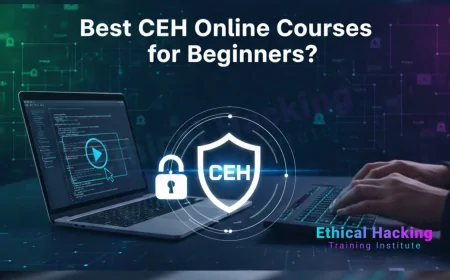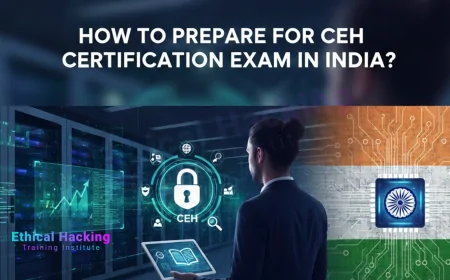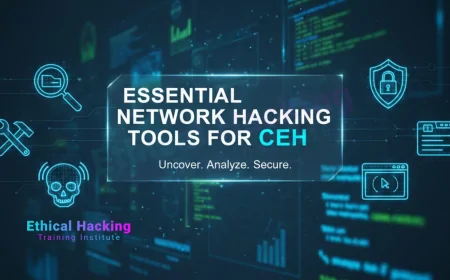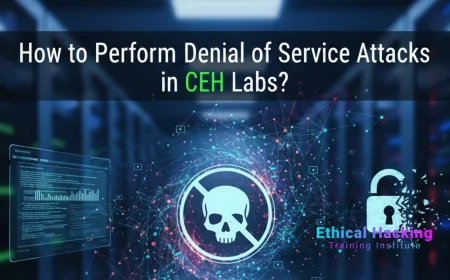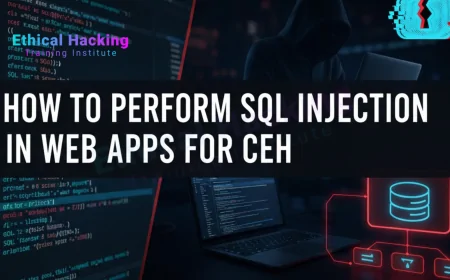Ethical Hacking Courses with Certification: Start Learning and Get Certified Today! | Start Your Career in Cybersecurity with Certified Ethical Hacking Courses
Explore top ethical hacking courses with certification. Learn online, access labs, and get certified to boost your cybersecurity career in 2025.

Table of Contents
- Introduction
- Why Get Certified?
- Types of Courses
- Top Courses for 2025
- Tools & Skills You'll Learn
- Course Formats
- Importance of Lab Access
- Certification Costs & ROI
- Career Paths After Certification
- Choosing the Right Course
- Getting Started Steps
- Frequently Asked Questions
- Conclusion
Introduction
As cybersecurity threats escalate globally, authorized professionals who can think and act like hackers—but ethically—are in high demand. Ethical hacking courses with certification blend hands-on labs, real-world techniques, and recognized credentials. This guide covers the best courses for 2025, formats, tools you’ll use, and how to begin your certification journey.
Why Get Certified?
Getting certified in ethical hacking is more than just a résumé booster—it’s a strategic career investment. Here's why:
Industry Recognition:
Certifications like CEH (Certified Ethical Hacker), OSCP, and CompTIA PenTest+ are internationally recognized. They validate your skills in penetration testing, vulnerability assessment, and ethical hacking methodologies.
Career Advancement:
Certified professionals have access to specialized roles like Penetration Tester, Red Team Analyst, or Security Consultant. Many cybersecurity job postings list certifications as mandatory or highly preferred.
Higher Earning Potential:
According to industry salary reports, certified ethical hackers earn 20–40% more than their non-certified peers. CEH professionals, for instance, often earn $80,000–$120,000/year globally.
Hands-On Skills Validation:
Practical exams like CEH Practical or OSCP prove you can apply what you’ve learned in real-world hacking scenarios—giving employers confidence in your ability.
Compliance and Legal Work:
In regulated industries (like finance or healthcare), certification is often a requirement for working on secure systems or conducting internal audits.
Better Freelance & Bounty Opportunities:
Platforms like Bugcrowd or HackerOne favor certified professionals for higher-tier bounty programs and private engagements.
Keeps You Current:
Certifications require continuing education or periodic renewal, ensuring you stay updated with the latest threats, tools, and defenses.
Types of Courses
Ethical hacking courses vary based on skill level, focus area, certifying body, and learning format. Here’s a categorized breakdown to help you choose the right path:
1. Beginner-Level Courses
Ideal for newcomers with minimal technical background. These focus on foundational cybersecurity and ethical hacking skills.
-
eJPT (eLearnSecurity Junior Penetration Tester)
Hands-on practical for beginners; covers networking, scripting, and basic exploitation. -
CompTIA Security+
Vendor-neutral certification covering security basics and risk management. -
TCM Security’s “Practical Ethical Hacking”
Self-paced, hands-on, and beginner-friendly with real-world tools.
2. Intermediate-Level Courses
Great for professionals with some IT/security experience, these offer deeper tools and methodology training.
-
CEH (Certified Ethical Hacker) – EC-Council
Most recognized ethical hacking credential; covers 20 domains including AI, cloud, and IoT security. -
CompTIA PenTest+ (PT0-002)
Mixes multiple-choice and performance-based questions; great for penetration testers. -
Hack The Box Academy Paths
Interactive, gamified courses on topics like enumeration, privilege escalation, and exploitation.
3. Advanced-Level Courses
Designed for professionals ready to dive deep into red teaming, exploit development, and advanced penetration testing.
-
OSCP (Offensive Security Certified Professional)
Rigorous 24-hour practical exam; ideal for real-world pentesting careers. -
SANS GIAC GPEN/GXPN/GCIH
Advanced certifications in network pen testing, exploit writing, and incident handling. -
eCPTX (Certified Professional Penetration Tester – eLearnSecurity)
Advanced hands-on course focusing on modern exploitation techniques.
4. Specialty Certifications
Focused on niche areas of ethical hacking and security.
-
Mobile Security: GMOB (GIAC Mobile Device Security Analyst)
-
Cloud Security: CCSK, AWS Security Specialty
-
Web App Testing: Burp Suite Certified Practitioner, Web Security Academy (PortSwigger)
-
Red Teaming: Red Team Ops (RTO), CRTP (Certified Red Team Professional)
5. Free/Open Source Courses
Best for exploration and initial practice.
-
-
TryHackMe (Beginner Path)
-
Hack The Box (Starting Point, Tier 0–1 labs)
-
Cybrary – Intro to Ethical Hacking
-
MIT OpenCourseWare – Computer Systems Security
-
Top Courses for 2025
CEH v13 (EC‑Council)
Features updated AI modules, 550+ attack techniques, and authorized exam prep.
OSCP (Offensive Security)
90-day labs and hands-on 24h exam. For serious, technical learners.
CompTIA PenTest+ (PT0‑002)
Vendor-neutral, balanced MCQ + performance; great for intermediate learners.
SANS GIAC GPEN
Enterprise-focused, includes manual and automated pen-testing techniques.
eJPT (eLearnSecurity)
Good for beginners; affordable, practical, beginner-friendly.
Practical Ethical Hacking (TCM Security)
Self-paced, project-based, modern tool integration.
Tools & Skills You'll Learn
- Networking fundamentals (TCP/IP, routing)
- Scripting: Python, Bash
- Recon & scanning: Nmap, Nessus
- Exploitation: Metasploit, custom payloads
- Web testing: Burp Suite, OWASP ZAP
- Network analysis: Wireshark
- Cloud/IoT testing, evasion techniques
Course Formats
- Self-paced video: Udemy, TCM, interactive content.
- Live online: EC‑Council iClass or ATC webinar-style training.
- In-person bootcamps: SANS, Offensive Security intensive labs.
- Gamified platforms: TryHackMe, Hack The Box for CTF-style engagement.
Importance of Lab Access
When it comes to learning ethical hacking, theory alone is not enough. The real value lies in practical, hands-on experience—and that’s where lab access becomes essential.
Why Lab Environments Matter
Safe Environment to Practice Hacking
- Labs offer a legally isolated sandbox where you can test exploits, break systems, and analyze vulnerabilities without consequences.
Skill Reinforcement Through Simulation
- Real-world attack scenarios help you apply what you’ve learned from books or videos, making knowledge stick better.
Better Preparation for Certification Exams
- Certifications like CEH Practical, OSCP, and PenTest+ include live or simulated environments. Training in labs mirrors those experiences.
Mastery of Tools
- Labs let you work with industry-standard tools such as:
-
-
Nmap, Burp Suite, Metasploit
-
Wireshark, John the Ripper, Hydra
-
Aircrack-ng, Nessus, Nikto, etc.
-
Types of Labs You’ll Encounter
-
Pre-configured Labs
Examples: TryHackMe, Hack The Box, CEH labs
– Ready-made vulnerable machines to explore common attack vectors. -
Custom Virtual Labs
Examples: VirtualBox, VMware setups
– You configure your own network and targets for advanced testing. -
Cloud-Based Sandboxes
Examples: EC-Council iLabs, Offensive Security PWK labs
– Scalable, remote, secure platforms to simulate full enterprise scenarios.
Bonus Benefits
-
Repeatability: You can try the same exploit multiple times without damaging live systems.
-
Progressive Learning: Labs often increase in complexity—perfect for leveling up.
-
Cert Exam Readiness: Many platforms now include grading, flags, and scoring (like CTFs) to prepare you for exam formats.
Certification Costs & ROI
| Certification | Cost Range (USD) | Why it's worth it |
|---|---|---|
| eJPT | $200–300 | Beginner-friendly, fast credential. |
| PenTest+ | $350–500 | Balanced budget, recognized mid-level. |
| CEH v13 | $1,200–2,500 | Strong industry recognition. |
| OSCP | $1,300–1,500 | Practical mastery highly respected. |
| GIAC GPEN | $1,900–2,500 | Enterprise credential with broad value. |
Career Paths After Certification
- Junior & Senior Penetration Tester
- Security Architect & Engineer
- Red Team Specialist
- SOC Analyst or Threat Hunter
- Cybersecurity Consultant
Choosing the Right Course
- Match certification demand to your career goals
- Check for included exam vouchers and live-lab access
- Review syllabi for AI, cloud, IoT coverage
- Read testimonials and outcomes from past students
Getting Started Steps
- Begin with a free or affordable course (e.g., eJPT or TCM)
- Earn practical experience using TryHackMe/HTB labs
- Choose your main certification (CEH/OSCP) for in-depth training
- Plan study schedule and arrange for lab time
- Register and prepare for exam with mock tests
Frequently Asked Questions (20)
1. What’s the easiest ethical hacking cert?
eJPT is beginner-friendly with straight‑forward practical testing.
2. Is CEH good for beginners?
Yes—with guided study and labs, CEH is accessible for entry-level. Need good foundational skills.
3. Do I need scripting skills?
Basic Python or Bash is helpful, especially for automation and exploit creation.
4. How long does certification take?
Self-paced: 1–3 months. Bootcamp-style: 1–2 weeks intensive.
5. Are these certificates recognized globally?
Yes—CEH, OSCP, and GIAC are well respected worldwide.
6. Do lab-based courses cost more?
Often—lab access adds cost, but boosts learning significantly.
7. Can I do it while working?
Absolutely—many courses are evening or weekend-friendly.
8. Is OSCP harder than CEH?
Yes—OSCP demands more hands-on real-world problem solving.
9. Can I retake exams?
Yes—retake policies vary (e.g., free with OSCP labs, fee‑based for CEH).
10. What are CTFs?
Capture‑the‑Flag challenges—timed hacking puzzles, great for skill building.
11. Should I start with free courses?
Yes—TryHackMe, HTB Starting Point, and TCM's beginner tracks are excellent.
12. How much do these courses cost?
Ranges from $200 (eJPT) to $2,500+ (GIAC), depending on depth and labs.
13. Do I need a degree?
No—many ethical hackers are self-taught and certified without formal degrees.
14. How do I maintain certification?
CEH: 60 CPE credits every 3 years; OSCP: no renewal needed.
15. Are discounts available?
Yes—look for student, military and seasonal vendor promotions.
16. Will it get me a job?
Yes—but real-world skills and portfolio are equally important.
17. Can I freelance after cert?
Yes—many bug bounty and freelance pentest work becomes accessible.
18. Are online bootcamps effective?
Yes—with live labs and teacher support, they closely match in-person quality.
19. What should my study plan include?
Theory, lab practice, mock tests, and review of topics weak for you.
20. Which certification is most respected?
OSCP is top for technical rigor; CEH and GIAC are widely accepted in enterprise roles.
Conclusion
Investing in ethical hacking courses with certification equips you with cutting-edge skills and recognized credibility. Starting from entry-level options to advanced, hands-on programs, there’s a clear pathway to a rewarding cybersecurity career. Commit to consistent learning and active practice—and certification will follow.
What's Your Reaction?
 Like
0
Like
0
 Dislike
0
Dislike
0
 Love
0
Love
0
 Funny
0
Funny
0
 Angry
0
Angry
0
 Sad
0
Sad
0
 Wow
0
Wow
0






